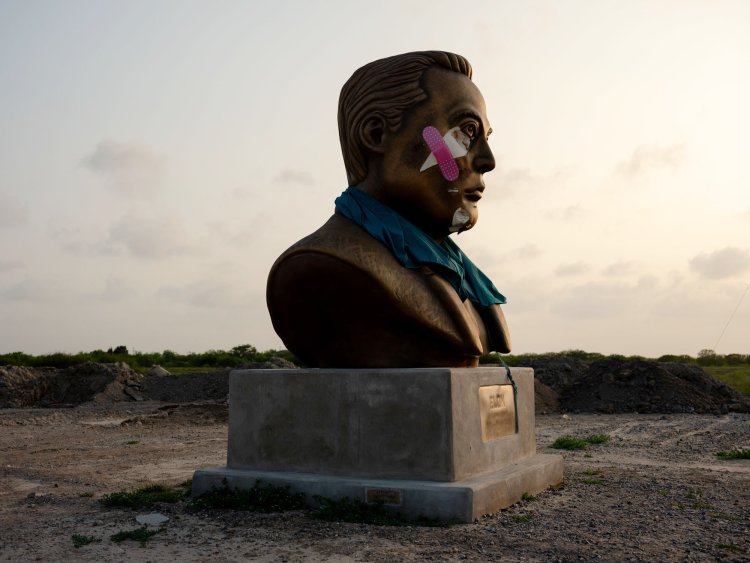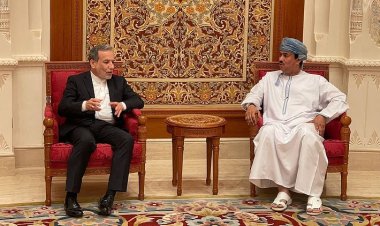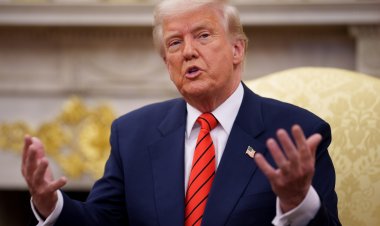Elon Musk No Longer Focuses on Washington; He’s Now Constructing His Own City in Texas.
Elon Musk made an attempt in Washington. Now, he's setting his sights on becoming the unofficial mayor of a small town in Texas.

That is, until the brush parts to unveil a striking gold bust of Elon Musk, gazing into the horizon.
Suddenly, signs of a political landscape emerge. U.S. Immigration and Customs Enforcement agents, clad in bulletproof vests, stop cars at an inland border checkpoint.
A side road bears the name "Mars-a-Lago," and a short distance away, murals of Musk's visage and the DOGE Shiba Inu adorn two 30-foot concrete silos flanking a weathered black Studebaker parked for sale in a dusty turnout.
In the backdrop, juxtaposed against the vast salt plains, homes and hangars, office buildings, and streets stand in the shadow of towering rocket ships and suborbital vehicles. This is Starbase, poised to become Texas's newest city and the first of its kind operated by Musk. This remote settlement, largely comprised of SpaceX employees and construction workers, serves as the launchpad for SpaceX’s next-generation Starship rockets and a base for humanity's efforts to colonize Mars.
“What’s happening here is incredible,” Kit Frederic, an Oregon native who recently purchased nearby undeveloped land, remarked, drawn in by its proximity to space endeavors. “Someday every state in the union is going to want something like this.”
Currently, this approximately 1.5 square mile enclave remains technically unincorporated Boca Chica Village. However, on Saturday, the roughly 200 residents, primarily SpaceX employees, will vote to determine whether the land surrounding Musk's colossal rocket launch pad should be established as its own city: Starbase, Texas. The election heralds a significant shift in governance since a petition from several residents prompted Cameron County to schedule a vote on the incorporation of Starbase. Such a transition would afford SpaceX greater independence, essentially its own governing body, allowing the company more leeway in how and where it builds.
Nearly 2,000 miles from Washington, this election unfolds during a peculiar period for Musk. Once viewed as a major influence in politics, he now aims to set regulations on a grassroots level, constructing a new city from the ground up in rural Texas. Transitioning from a period where he seemed a "shadow president," he stands to become the de-facto mayor of his own small town.
Not everyone in Brownsville, a neighboring city with a population of 200,000 and just 20 miles away, is eager to welcome Musk as a neighbor. Since SpaceX's arrival in Cameron County a decade ago, rents have climbed nearly 15 percent, and access to a nearby beach has been curtailed for locals during rocket launches, provoking frustration among residents who find their main recreational outlet limited. Concerns about Musk's actions at the federal level have left some apprehensive about the implications of an unrestrained Musk in South Texas.
For months, many believed the election's outcome was predetermined. A significant portion of the land within the proposed new city's borders belongs to SpaceX, and the majority of voters are its employees. Gunnar Milburn, SpaceX's security manager, was initially listed as a candidate for the town’s first mayor, a title now assigned to Robert Peden, a SpaceX vice president. Two other staff members—an engineering manager and the senior director of environmental health and safety—would take on roles as city commissioners. Nationally, Musk would function as an unelected overseer.
The election is pivotal in the evolving dynamics between Musk, Cameron County, and the broader nation. Musk has become one of the least popular figures from the Trump administration, even among Republicans, and his influence appears to be waning. Local officials in Cameron County, long supportive of SpaceX, are drawing firmer boundaries regarding the company's expected powers. As election day approaches, activists and organizers who have contested SpaceX's presence for years are redoubling efforts to resonate with voters. If the measure passes, it could enable land seizures through eminent domain, restrict public beach access, and reduce oversight of SpaceX’s operations. Conversely, a defeat for the measure would reflect poorly on Musk, indicating a lack of support, even among his employees.
With the evolution of the company town model, the implications of this election could shape the future of Starbase and the relationship between the company and its residents.
On a recent weekday in "downtown" Starbase, a man on an electric scooter zoomed down a new road labeled "Memes Street," clad in a T-shirt reading “For God, For Country, For Space Exploration.” Nearby, construction crews were busy building additional rows of black-and-white ranch houses.
Without the presence of rockets and towers looming overhead, you might mistake Memes Street for a typical, newly developed neighborhood in Austin. Driveways show an abundance of Teslas and Cybertrucks, along with a few dirt bikes. A small soccer field is tucked in nearby, while dozens of Airstream trailers serve as temporary housing on an astroturf lawn.
The pace of construction is relentless. From all sides, heavy machinery is carving out new territories in the shadow of the SpaceX logo. Where there were only salt plains, a network of streets is emerging, marking the infancy of a new community.
In a decade, should the election result align with expectations, this moment might serve as a relic of Starbase’s humble beginnings. Yet, the transformation from a few scattered residences along dirt roads to what is now Starbase has been dramatic.
A decade prior, SpaceX’s entry into South Texas was met with much anticipation. After considering numerous locations nationwide, the company decisively settled on Cameron County, one of the poorest in the nation, for its launch pad and rocket facilities. This decision was hailed as an economic victory for a region grappling with high poverty rates and low educational attainment, with hopes that the company could invoke substantial change.
SpaceX cited low latitude for over-water launches and minimal population density as primary reasons for its selection of the South Texas coast, but the company also negotiated a remarkable deal—Cameron County provided SpaceX a 10-year tax break. This was justified by then-County Judge Carlos Cascos, who suggested the project would create hundreds of jobs and result in millions in economic benefits for the area.
The launch pad’s location, near the shores of the Gulf of Mexico, in Boca Chica Village, was historically significant as the site of the final battle of the Civil War and was minimally populated, being known primarily as the access point to Boca Chica Beach—a beautiful stretch of sand that meets the mouth of the Rio Grande.
Development commenced in the late 2010s with plans originally oriented towards supporting the Falcon 9 rocket. However, Musk pivoted in 2018 towards leveraging the launch site for the construction and testing of the Starship, stating, “We’ve got a lot of land with nobody around, and so if it blows up, it’s cool.”
Yet, people were already residents. As the high-tech industry took root, dissatisfaction grew among Cameron County residents over environmental issues, alleged pollution in local bays, and complaints regarding the vibrations from rocket launches affecting their homes. Perhaps the most critical concern involved Boca Chica Beach’s accessibility, previously a family-friendly gathering spot that was intermittently closed for highway launches.
Over the past decade, SpaceX has claimed to have positively impacted the local economy by creating over 3,000 jobs and generating nearly $100 million in economic activity. Thousands now work at the facility, which functions as the primary production and testing location for Musk’s Starship rockets.
Nevertheless, perceptions of SpaceX among residents vary. “They’re claiming they’re bringing economic incentives, but the rent is going up, the roads are crumbling,” said Bekah Hinojosa, a community organizer from the Rio Grande Valley. “It is getting harder to live here. All this seems to benefit is fancy restaurants with SpaceX clientele.”
Hinojosa perceives the county’s accommodation of SpaceX as a betrayal. She believes that community leadership has failed its residents, instead creating high-paying jobs for outsiders rather than supporting the local Brownsville population, the majority of whom are Latino and working class.
While SpaceX did not respond to inquiries from PMG Magazine, Cameron County Judge Eddie Treviño, a Democrat, defended the decision to welcome SpaceX, viewing it as a calculated risk. Recent reports suggest that the number of high-income households in Brownsville has doubled in recent years, with SpaceX becoming the area's largest employer.
“We've had a brain drain for decades,” Treviño noted. “And thankfully, we're seeing that brain drain exodus decreasing and even becoming the opposite.”
For years, local politicians have largely supported SpaceX and its county relationship. The proposed incorporation of a company city has not shifted that stance, with Treviño asserting that the incorporation would not significantly alter the county's relationship with the company. However, it could drastically change residents’ dynamics with SpaceX.
As SpaceX moved towards a vote for Starbase, Musk’s company also backed a legislative package, featuring identical bills in the Texas statehouse. The proposed legislation would afford municipalities with “spaceports” the authority to limit public beach access, seemingly targeted at Boca Chica, thus granting SpaceX the ability to close Highway 4 during space-related activities—currently a power held only by the county.
Control is a primary driver behind SpaceX’s pursuit of incorporation for Starbase. The newly formed city would manage its own building permits, bypassing regulatory hurdles at the county level, control local laws and taxation, and apply for both state and federal grants. While the ability to close the highway for launches is beneficial, creating a city would confer autonomy beyond that aspect.
Activists like Hinojosa see these bills as part of a broader design where Starbase symbolizes the encroachment of a tech oligarchy on local culture. Yet, even for elected officials, the legislative proposals have sparked a reaction. Shortly after the bills were reviewed, Cameron County Commissioner Sofia Benavides expressed her strong opposition on social media. Treviño, a long-time supporter of SpaceX, stated that the county “would not be in support of it,” criticizing the bills for fostering unnecessary conflict. On Monday, lawmakers opted not to advance one of the bills.
This moment may ripple through the usually tranquil surroundings, with Treviño continuing to endorse the mutual benefits of the relationship between the county and SpaceX. He believes any community—be it New York, Austin, or Dallas—would pursue similar assurances if faced with the financial realities of the region, viewing this path as singularly necessary.
However, Treviño also has his roots in Cameron County, recalling cherished childhood memories of swimming at Boca Chica Beach.
“I think for most people, no matter what SpaceX does, they'll never accept them,” Treviño acknowledged. “My job has been to figure out how to bring better paying jobs to our community. And I hope to God that we're not wrong about this.”
In mid-April, just days before early voting was set to commence, a group of five volunteers from Hinojosa’s South Texas Environmental Justice Network gathered in downtown Brownsville, embarking on a last-minute mission to influence the Starbase election with pamphlets and scripts in hand.
Sharing Hinojosa's concerns about what Starbase Texas might entail for the broader community and SpaceX employees, the volunteers believed Musk aims to create a wealthy enclave distinct from the surrounding area. They feared those living in Starbase would be subject to Musk’s whims, navigating life under his governance without accountability to the broader electorate in Cameron County.
Despite initial assumptions that the election was a foregone conclusion—predicated on the understanding that nearly all voters were SpaceX employees—the volunteers felt they had a chance to challenge that belief. They quickly found, however, that most residents were reluctant to discuss incorporation, shutting doors and expressing concerns.
“Every single person we talked to, they would say, ‘I'm not at liberty to respond. I cannot state my opinion. No comment,’” reported Viviana Treviño, an organizer and biology professor at a local university, who is not related to Judge Treviño. “It was as if they were following a script.”
Within 15 minutes, their canvassing was interrupted by an unmarked truck filled with security personnel from SpaceX, who informed the volunteers they were trespassing on private property. Treviño challenged them, questioning their authority to remove canvassers from a public road. The security team refused to provide answers, insisting they must leave. The group returned to Brownsville, shaken by the encounter.
Planned follow-up events—additional canvassing, a presence outside polling stations in Starbase on election day—now appeared daunting in light of this incident. The beach closures and legislative efforts had already raised alarms about a future Starbase inequitable governance. The encounter with security heightened worries about free expression and safety in the territory.
“I've done political organizing in much more conservative towns, and I've never felt the degree of discomfort that I felt while I was there,” Kit Noel, another volunteer, stated. “It was surreal. It was jarring.”
Despite the unsettling experience, the organizers left with some hope. In conversations with Starbase residents, they detected a glimmer of dissent regarding incorporation. One resident expressed concern about limited beach access, while another voiced discomfort about living under the auspices of their employer. A long-time local acknowledged his opposition to incorporation yet resigned himself to the prospect.
Should incorporation proceed, the implications for how Starbase interacts with Cameron County will be significant. Most directly affected will be the residents of Starbase themselves, living under the shadow of their employer—echoing the historical model of company towns.
According to Brian Highsmith, an incoming professor at UCLA who has studied company town governance, it is reasonable for employees to fear speaking out against their employer's interests.
“You don’t have to speculate about what would happen. They would reasonably make the conclusion that if they defy the interests of the company or Elon Musk, they would be fired,” Highsmith contended. “Those do not seem like unreasonable fears to me.”
For much of American history, company towns represented an integral component of the economy, where workers lived and worked in structures owned by their employers. Yet, shifts in society—such as the rise of the automobile and increased unionization—have rendered this model largely obsolete. Running a town introduces significant challenges, and for companies, it can be an expensive burden. Today, few examples persist, with Walt Disney World's special district in Orlando being one of the most notable.
It remains uncertain whether residents of Starbase view themselves as part of a larger historical trend or view their situation as entirely unique. As Noel and Treviño discovered, many seem reluctant to discuss the issue openly. However, it is likely that SpaceX is proceeding with a clear understanding that, despite potential consequences, the autonomy gained through a self-governing body serves its strategic interests well.
“For Disney at least, the special district has worked out very well for their interests, and very poorly for the interests of the people of greater Orlando,” Highsmith noted. “I suspect that would be the case here.”
In Starbase, zealots of Musk’s vision are evident among the fringe groups near the launch complex, with fans wearing SpaceX hats alongside families snapping photos of the rocket facilities. The Musk iconography—a DOGE mural, the gold bust labeled with "memelord" at its base—serves as a surreal reflection of internet culture, juxtaposed against the vast landscape of the Rio Grande Valley. While Musk’s influence may be waning in Washington, a dedicated base of supporters remains in his orbit, even in Cameron County.
Yet, the bust serves as a marker of shifting sentiment. Just days before early voting, the statue was vandalized; significant portions of its chin and left side were smashed off. The damage was later hastily concealed with a tarp, creating the appearance of Musk wearing an oversized blue bonnet. A large Band-Aid now covers the gouged area.
The upcoming election will determine Musk's future influence in local governance in this remote region. Still, backlash is already evident.
“It’s the richest man on the planet using us as a testing ground,” Hinojosa lamented. “Elon Musk is on his way to colonizing Mars. First, he’s trying to colonize this community.”
Lucas Dupont for TROIB News
Discover more Science and Technology news updates in TROIB Sci-Tech












